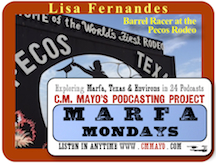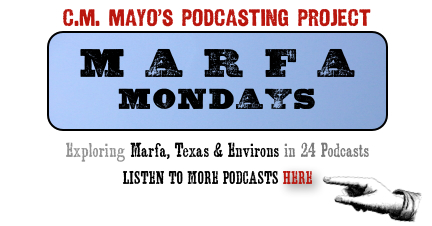|
Author of The Last Prince of the Mexican Empire, etc. |
|
|

|

|

|
|
LISA FERNANDES, BARREL RACER AT THE PECOS RODEO |
|||
 |
|||
|
(APPROX 23 MINUTES) |
|||
|
|
|||
|
When you drive into
Pecos, one of the first things you'll see is the sign alongside
the Buck Jackson Arena of a cowboy riding a bucking bronco under
the legend, "Home of the World's First Rodeo." Before the first performance of the Pecos Rodeo, I had a chance to watch slack— more about what that is in a moment— and when it was over, out back in the participants' parking lot, I interviewed one of the barrel racers. I confess I was little worried about how this recording would come out because it was a bit windy, and since it was the end of the day, that parking lot was roaring with trailers and trucks pulling out. But we hopped into the cab of her truck, and I think you'll agree, the sound quality turned out to be pretty good. [MUSIC] Lisa Fernandes: Well, my name is Lisa Fernandes and I am from Pecos, and I go to a handful of rodeos a year. I don't go to a lot, and of course this one's home town for me, so I'm here. I really had no business entering this year, I sold my good horse last year, so I ran a baby tonight, and since she's just four so that was a lot to ask of her. And she handled it really well, I was super proud. So that's what I'm doing here tonight. C.M. Mayo: How does it work? This is what's called "slack." Lisa Fernandes: Yes. C.M. Mayo:… and people who don't know about rodeo don't know what that is. Lisa Fernandes: Okay, slack is... they will
only run 10 barrel racers in the performance, and they'll have
a performance Wednesday night, Thursday night, Friday night,
and Saturday night. So that's four performances so that allows
for four barrel racers. Well, there were 90-something entrees
in the barrel race. So instead of having nine performances or
running 20 horses and runners in a performance, which would drag
the performance out and make it really slow because there might
be 80 calf-ropers and 75…you know, this is to take up the
"slack." So instead of running in a performance, you
still get money, you're still part of the rodeo, but it's just,
we're the extras. The barrel race is a one-run in Pecos. Now, some places have more than one for the barrel race. Other events have two runs or three runs. So, like the steer roping, which we saw earlier tonight, those steer ropers, that was their second run; they also made a run this morning. And some of them will come back for their second run in a performance starting tomorrow night. C.M. Mayo: Oh, so you can do both slack and a performance or just slack? Lisa Fernandes: Right, if it's in certain events because like I said, with the barrel race, we're only allowed one run at Pecos. So I'm done. No matter how good I do tonight, I'm done because we get one run. But some events like the steer roping get more than one run, and so then it becomes an average that competes. So they will run again, the steer ropers. The team ropers get two runs, but like, the bull riders, they'll have one. They get one ride, and that's it. So it just depends, each event is different. C.M. Mayo: When you're done, and they time you, that's your score? Lisa Fernandes: That's it. Yes, ma'am. C.M. Mayo: … and then, how does that count? Lisa Fernandes: Fastest time wins. So they will probably pay 12 holes, 12 times. Of course, the first place gets the most money, and then after that, it decreases all the way down to… I'm assuming, they'll pay 12, they usually do here. And then number 13 is out of luck. [Laughs] C.M. Mayo: Oh, so now if you win the barrel racing, what do you get? Lisa Fernandes: I believe... well, you know, it kind of depends on how many are entered, but it could pay up to about 3,000 dollars, and I think they probably are giving a buckle, and I'm not sure what else. I'm not sure what all prizes they're having here. C.M. Mayo: So a lot of people do the circuit of rodeos? Lisa Fernandes: A lot of people, a lot of people… like my friend that I was telling you about over here, Janna, she will leave here, and she will go up to Santa Fe, and then go north up into Colorado and like, Arizona, and go to a bunch of rodeos out there. So me, I will not. [Laughs] They had a local barrel race on Saturday night and took the top so many of that for a run Friday night, so I'll get to come back on my little mare Friday night and run here, and then my hauling partner and I will go down to Sonora for a run, and then we'll be done for a while. C.M. Mayo: Sonora, Texas? Lisa Fernandes: Sonora, Texas, yes ma'am. C.M. Mayo: So you just do a local...? Lisa Fernandes: We kind of did local. We went to Big Spring last week, and we'll run again here Friday night in a little different type deal, and then we'll run down to Sonora Saturday. And then like I said, we'll be done for… we don't travel very far. C.M.
Mayo: You
race horses, and you train horses? Lisa Fernandes: Yes ma'am. I taught school for 21 years. My husband is a rancher, and I kind of did the horses on the side, and I resigned from my teaching position this year, and I'm riding full time now. C.M. Mayo: How did you get interested in horses and in coming to the rodeo and doing barrel racing? Lisa Fernandes: I grew up on a ranch east of Fort Stockton, and so I grew up riding. My parents grew up on ranches, and so it's just what we've always done. We've always had horses. We've always ridden. My dad trained cutting horses for a little while and ranched... and... there's my friend, Julie, right there. This is my hauling partner. [MUSIC; THEN RETURN TO INTERVIEW] C.M. Mayo: It must be a lot of fun to see friends out here. Lisa Fernandes: It is! We have good visits, and see people that I might not see otherwise and get together, and it's all serious competition, and we all cheer for each other and root for each other, and it's kind of like a big family. Just some fine people. And lot of them rodeo full time and a lot of them just go to, you know, like us, just a few rodeos here and there, and some of them are professional rodeoers that just go all the time. And a lot of them are ranch people just like us. So yeah, it's fun. C.M. Mayo: It's a mix of different… Lisa Fernandes: It's a mix, it really is. C.M. Mayo: So to get your horse to be trained to go around those barrels, you must have to work pretty hard at that. Lisa Fernandes: Do. They need to be very responsive and listen, and I started this little mare almost a year ago. Like I said, she's young. She's really… C.M. Mayo: She's four years old? Lisa Fernandes:
She's just
four, and so she's really a little younger than what I would
want to do this on. This was kind of… just the handful of
things we're going to do is not going to hurt her, that's for
sure. And I was really pleased with her tonight. C.M. Mayo: Oh, so she might have gotten scared by a lot of big crowds. Lisa Fernandes: Exactly, that's why I wanted to run in slack. That's why I wanted to run in slack. I thought we'd make her first one a good, quiet experience with few distractions. C.M. Mayo: … and so you have to ride her every day and do barrels at your ranch? Lisa Fernandes: Yes, and I don't necessarily.
She's working good, so I don't necessarily work the barrels on
her every day, but I ride her every day to keep her legged up
and in shape. C.M. Mayo: A typical horse that does really well at this, what is the age range that they usually are? Lisa Fernandes: A lot of people start competing on them when they're four, when they're her age. Some of them like to wait until they're five, depending on the maturity of the horse. Mine happens to be very, very mature thankfully. I have another one that's seven and is not near as mature as this four-year-old. So you know, just like people, they vary, but four to five years old is when they start. Now, your rodeo horses,
these horses that are coming here and going a lot, they have
a tendency to be... you know, they're eight, nine, ten and on
up. You know, you might even see some 17, 18, 19 year old horses
out here, and they've got that experience, and they're smart
and you know, they know the ropes. C.M. Mayo: It's always the three barrels? Lisa Fernandes: Yes ma'am. It's the same pattern. C.M. Mayo: … and I was hearing times varying from 17 to 22 seconds. What was your time on this, if you don't mind me asking? Lisa Fernandes: 18.44. C.M. Mayo: … which was a really good time. Lisa Fernandes: It wasn't bad. It really wasn't bad at all. I think a 17.98 was the fastest time run tonight, so about a half a second off the leader. For a baby, I was real proud of that. You know, half a second's not a lot. C.M. Mayo: What's the shortest anybody's run that? Lisa Fernandes: Well, you're going to get
different times in different arenas because here, we have a big
arena so we set up a big pattern. C.M. Mayo: When one looks at the rodeo circuit, where does Pecos fit in that? I know it's the first rodeo... Lisa Fernandes: It is. C.M. Mayo: … but other than that, I don't have a sense of context for it. Lisa Fernandes: Pecos is, besides being the
home of the world's first rodeo, it's one of the better rodeos
as far as pay is concerned because we add quite a bit of money
to our rodeo. It's just kind of one that everybody wants to come
to. Everybody wants to win Pecos. Anybody who's ever rodeoed
in the world wants to win the Pecos Rodeo, everybody.
C.M. Mayo: Because it's the first? Lisa Fernandes: It is. There's so much history here. It's just steeped in western history, besides just being a really good rodeo that pays well, it's just so… it's a special one. C.M. Mayo: Well, I was over at the [Rodeo] Hall of Fame and the [West of the Pecos] Museum, and I saw some of the pictures of the early rodeo and... Lisa Fernandes: And you know, that's the thing, if you can come here and win the Pecos Rodeo, your name is right there on a long list of people who are the pioneers in rodeo, and it's a special one, it really is. And [I say that] not just because I live here. It's special. You can ask anybody who knows anything about rodeo in the world, and they will tell you that Pecos, Texas is special. C.M. Mayo: You've been coming here to this rodeo for a long time. Lisa Fernandes: Yes, I have. I've lived in Pecos for 21 years, and I think the only year I didn't enter was the year I was pregnant with my son. C.M. Mayo: So that's 20 years of the rodeo! Lisa Fernandes: It is, it is. I've never won. I've placed, but I've never won it. So [LAUGHS] one of these days… C.M. Mayo: Does your husband also do the rodeo? Lisa Fernandes: He used to. He roped for a long time. He's really focused more on his ranch and the cows and all of that business here lately, and he's certainly still very capable of it, but that's just not been his focus. C.M. Mayo: What's the name of your ranch? Lisa Fernandes: Fernandes and Sons Ranch Company, LLC. C.M. Mayo: It's cattle. Lisa Fernandes: Yes, ma'am, it's cattle. C.M. Mayo: … and also horse raising? Lisa Fernandes: Horses, we raise a few. Mostly, we just raise horses for our own personal use. We sell one every now and then. C.M. Mayo: Have you seen the rodeo change over the years? Lisa Fernandes:
It has some,
but not really. I mean, it's still the same events. Some of the
local things that we do have changes, but really for the most
part, it's the same events. It's the same. C.M. Mayo: The people who are here, they were just here for the day and they're all leaving now? Or some of them get to stay the night? Lisa Fernandes: Yes, I imagine most of them are going to leave. Unless there's somebody that has a run in the morning, there may be some people that'll stay the night that have runs in the morning in slack, but for the most part, these guys are headed out to other rodeos. C.M. Mayo: So they might be driving all night? Lisa Fernandes: Might be, it's very possible, absolutely. C.M. Mayo: Is that hard on the horses? Lisa Fernandes: You know, you wouldn't believe what they do for these horses to make things comfortable for them. We just had to drive 10 miles so we just brought a ranch trailer, but these trailers have got air-ride shocks, and they're filled with wood shavings this deep, and their legs are wrapped, and they've got cushions on their feet, and I mean... and fly masks to keep stuff out of their faces, and I mean, they go all out. These are like travelling hotels, some of these trailers are. Hotels for horses— and people, too, because the front part's got a little RV in them. C.M. Mayo: Oh, so people can spend the night with the horses. Lisa Fernandes: Right, with air conditioner,
a shower, and a lot of them have satellite TV. I mean, these
rigs are ready, and like I said, these trailers, the horse part
of them, they really are, they're fixed up to keep the horse
as comfortable as you possibly can. C.M. Mayo: Wow. Lisa Fernandes: You're going to make sure they're comfortable and happy, absolutely. You've got a top athlete, and you've got to go out there and compete against top athletes, so when you get there, you want them to be rested and ready and feeling good. Absolutely, they get the best care in the world, I can promise you that. [LAUGHS] C.M. Mayo: That is really something. And to think of all these horses and all these trailers out here in the back, that's extraordinary. I don't know Pecos well, I've just arrived, but it seems like a small town. Lisa Fernandes: It is. It is. C.M. Mayo: So this must be the event of the year. Lisa Fernandes: It is. This is a big deal for our town. Not only it is a big deal for the cowboys, it's a big deal for our town— and the surrounding areas, you know. We'll get people from all over to come watch the next few days. C.M. Mayo: Is there anything I should have asked you that I didn't? Is there anything when you run into people who don't know about rodeo that you really think that they should know that they usually just don't "get" about it? Lisa Fernandes: I think maybe what I just
said about how well these animals are cared for. And I mean all
the animals from the roping calves to the bucking... People
don't understand how much money these bucking bulls cost. I mean,
these bucking bulls are high dollar. These bucking horses...
I think probably the biggest thing that I notice is that people
who don't know, think that maybe it's cruel to go out there and
spur the horse when he's bucking. Believe me, when you have an
animal that's as valuable as these animals are, you're not going
to stand for any cruelty. They are babied, and they are very
well taken care of. I'm amazed at what people do to keep their
animals comfortable and happy and feeling good. C.M. Mayo: So he's your partner. Lisa Fernandes: He's your partner. C.M. Mayo: … or she's your partner. Lisa Fernandes: You know, there is nothing.... I cannot jerk and jog and whip enough to force her to go out there and perform. I might can make her go out there and do something, but not perform at that level, that elite level. It's not going to happen. In order for her to go out there—and those bucking horses, the same thing— in order for them to perform at that elite level, they have to like it. C.M. Mayo: So you felt your horse was happy? Lisa Fernandes: I was so proud of her. I just couldn't believe how well she did. She went out there, and she just found all three barrels, and she turned them, and she was solid. You know, her attitude tonight was, "I've got this, Mom. I've got this. Just let me do this. Just, come on. Let's just, you come along for the ride." That was her attitude tonight, and I loved it, every minute of it! I was a little nervous. I wasn't sure what she was going to do, but she had it. She had this, so I just came along and tried to stay out of her way. That's all I could ask. C.M. Mayo: That's beautiful. Lisa Fernandes: Believe me, she got cookies. C.M. Mayo: What kind of cookies? Lisa Fernandes: Horse cookies! [LAUGHS] Nicker
Makers! So she did, she got cookies. I was very proud of her.
She'll get an extra chip of hay tonight and a good rubdown. I
think she's a special little mare, and I'm really anxious just
to see what the future holds for her. C.M. Mayo: Thanks for listening. This
was number 18 of a projected 24 podcasts. You can find all the
Marfa Mondays podcasts at cmmayo.com/marfa.
Previous podcasts include number 11,
"Cowboy Songs by Cowboys," including an interview
with Michael Stevens; podcast number nine, "Mary
Baxter, Painting the Big Bend"; number six, "We Have Seen the Lights," about
the Marfa ghost lights, and podcast number three, "Mary
Bones on the Lost Art Colony." |
|||
|
|
|||
|
|||

|

